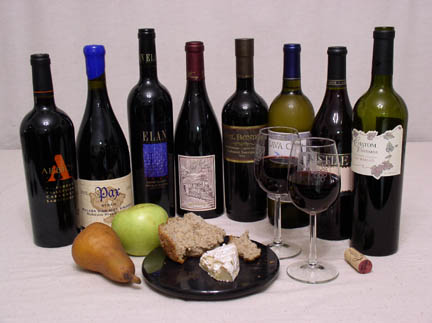
Flavor Notes by Robert Rich: Food, Wine, Restaurants & Recipes
Local Food Topics
Faces Behind the Wines
by Robert Rich, for MV Voice, February 2004
Highlights from the Family Winemakers Tasting
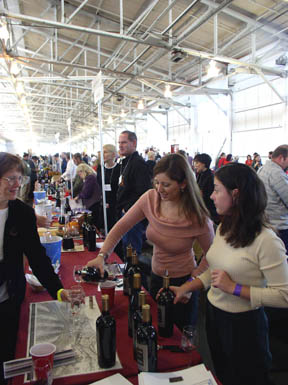
The wine industry hosts numerous huge tastings every year, many of which occur in San Francisco due to its location central to some of our best growers. The Family Winemakers Association hosts one of my favorite such tasting events every November.
This event provides an opportunity to try wines from some of the smallest vintners. Many of these wines won't get to supermarket shelves, and they often show more unique personalities than the big winemakers' offerings. They reflect how the human element informs the art of winemaking.
The sight is daunting, with rows of tables stretched to the distance inside Fort Mason Center, crowds of industry insiders tasting, spitting, taking notes and making deals. They who fail to spit can lose their palate quickly, if not their balance.
With over 400 wineries pouring thousands of wines, one can only grasp a tiny portion of the variety. Rather than racing through to cover maximum territory, I tend to move slowly to get more familiar with a handful of makers.
The few winemakers that I'll introduce here each reveal different facets of the world of smaller wineries. They all make excellent wines, ranging from good-value to premium blockbusters.
Individualists
I champion the vintners who make wines to satisfy their own ideals and personal tastes, allowing vineyard character to show through more clearly. They tend to take risks more willingly than large manufacturers, and put more of their heart into each glass of wine.
Many winemakers blame the point-scoring system that currently pervades the wine press for promoting an absolutist attitude toward flavor. The quest for points can push wines into a bloated style that overpowers food and ignores finesse. Yet high points help sell wines on retail shelves.
Since many small wineries don't have wide retail distribution, they sell their wine directly to customers, from tasting rooms and websites. Many states have tax laws that restrict direct wine shipments across borders. These laws favor the larger manufacturers who sell mostly through retailers.
The Family Winemakers Association formed in part to fight these shipping regulations, to lobby state governments for equal treatment of smaller winemakers, allowing them to ship directly to their customers.
Lava Cap
David Jones helped found Family Winemakers in 1992, and served as president for two years. A Stanford graduate and USGS geologist in Menlo Park, Jones taught Geology at UC Berkeley from 1985-96. In 1981 his family bought property above Placerville and planted vines.
David's son Tom Jones makes the wines, aiming for rich accessible flavors with soft tannins, good balance and a sense of place. Lava Cap's wines share a fragrance of mineral dust in the nose, concentrated from the decomposed granite soil.
Among my favorites: 2000 Mourvedre ($20), with deep chocolate, cherry, and Christmas spice perfumes; 2001 Petite Syrah ($30), inky black with granite dust, blueberry and raspberry notes and huge velvet tannins. All their wines show warm ripe flavors.
Chatom
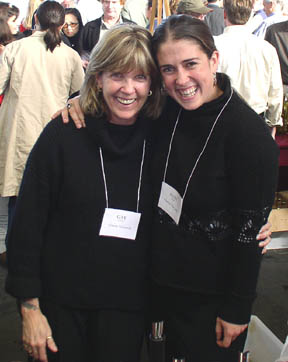
Owner Gay Callan first planted chardonnay and chenin blanc in Calaveras County back in 1981. Her vineyards have since grown to 65 acres and 14 varietals. Chatom's previous winemaker, Scott Klann, made soft and easy drinking wines with low acidity.
I found these wines seductive, approachable, and value-priced. Favorites among Klann's last releases include the 2000 Zinfandel ($16), a lush soft wine that smells like cocoa and berry cobbler; and 2001 Merlot ($24), ready to drink young with ripe dark fruit flavors.
New winemaker Mari Wells is now releasing her first vintage for Chatom. Her 2002 Chardonnay ($12) shows artful balance, with sweet green apple fragrances, buttery and smooth in the mouth with good oak balance. I look forward to tasting Chatom's forthcoming reds under this promising new winemaker.
Del Bondio
The Del Bondio family has grown fruit in Oakville and Rutherford since 1910, when prunes dominated the Napa valley. Replanting to vineyards 40 years ago, they sold grapes to surrounding wineries, including Frogs Leap.
Grandson Shawn Sellers and his father Rich Poncia began their label in 1997, with winemaker Randy Mason consulting. I met Poncia on a recent rainy November morning at the new winery. In coveralls and boots, more farmer than entrepreneur, Poncia looked a bit like Jerry Garcia.
He explained how they improved their vineyard with organic farming, composting grape wastes into natural fertilizer. Around the vineyards, boxes on poles offer homes for owls, hawks and bats to rid pests without poisons. The winery itself might receive organic certification in the near future.
Del Bondio avoids the over-oaked style common in Rutherford. The 2001 Syrah ($25) shows cherry and coffee perfumes covering an intense tannic backbone. The 1999 Cabernet Sauvignon ($38) has an earthy nose of cassis, brambles, pepper and musk, light mid-palate but lingering complexity. I prefer the '99 Cab to the 2000 vintage.
Elan
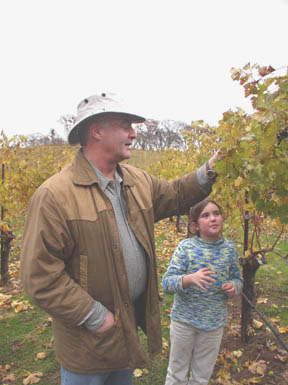
As Del Bondio shows honest Napa Valley floor character, Elan reflects the full structure and weight of a big mountain Cabernet.
Patrick Elliott-Smith bought his property near the summit of Atlas Peak in 1979. He lived in a teepee while clearing brush and planting Cabernet vines. He sold the grapes to Caymus for their premium Special Select.
Elliott-Smith started selling his own wines in 1992, making fewer than 1000 cases annually. He built a house of rammed earth where the teepee once stood, vineyards surrounding it, cellar beneath. Patrick's wife Linda helps run the business, their two children help charm the guests.
Elan 2000 Cabernet Sauvignon ($45) has become one of my favorite finds this year. This dark serious wine reminds me of Pomerol, with ferric blueberry aromas, herbal complexity and huge cocoa tannins. I tasted early vintages, and even 1992 stills showed youthful fruit and perfect structure.
Pride and Foley
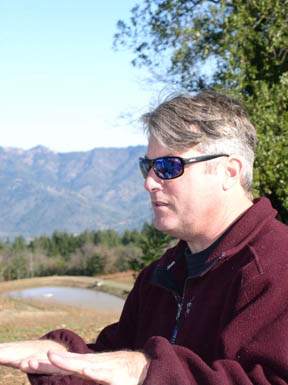
On the summit of Spring Mountain above St. Helena, Bob Foley makes giant full-bodied wines for Pride Mountain Vineyard. He also bottles his own label and consults for others.
The 2100 foot summit separates Napa and Sonoma valleys, with climate and soil perfect for growing intensely flavored grapes. Vines have grown here since 1869, and walls from the 1890 stone winery still stand.
I walked through these vineyards with Foley, then sampled from barrels in the cave. Each taste showed how variations in the rocky soils and sun exposure effect flavors in each small vineyard lot. Like all great winemakers, Foley stressed that the vintner's art comes from growing good grapes.
Foley's winemaking ideals show pure California sensibility: seeking full ripeness and maturity in these concentrated mountain grapes; striving for balance among massive points of flavor.
Foley's wines deservedly fetch high points and premium prices. Pride 2002 Viognier ($40) shows sweet tropical perfume, while 2001 Merlot ($48) offers deep flavors of chocolate, black cherry and coffee. Robert Foley 2001 Claret ($100) packs a wallop with concentrated inky intensity.
More Great Finds
With so many skilled winemakers, I can't possibly introduce them all. In brief, here are some other discoveries from the Family Winemakers tasting:
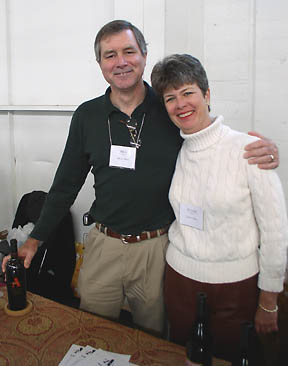
* Bill Arbios makes small amounts of his excellent Arbios Cabernet Sauvignon ($38) at a home winery in Santa Rosa, with complex aromas of cherries, leather and tobacco and light clean palate. His value-priced Praxis label features quality Pinot Noir and Viognier ($15).
* Pax Mahle makes only Syrah, in tiny lots from single cool-climate vineyards. Pax Syrahs show huge extracted fruit and deep tannins. Pax 2002 Sonoma Hillside ($25) exudes violets, smoke, liquorice and mineral earthiness. 2002 Castelli-Knight Ranch ($45) must be one of the biggest wines I've ever tasted, totally over the top.
* Dutch Bill Creek just released their exceptional first vintage 2002 Pinot Noir ($35) with huge round mouth-feel that delivers even more than its deep nose of black cherries, humus and tropical fruit. Their 2001 Chardonnay ($25) shows good complexity with soft buttery palate, apples and custard, and enough acidity to clear the palate.
You'll find tasting notes HERE
